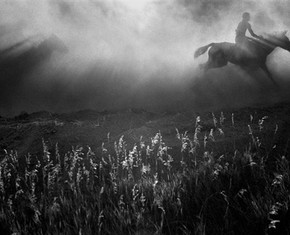The views expressed in our content reflect individual perspectives and do not represent the authoritative views of the Baha'i Faith.
When the Babi poet Tahirih removed her veil in Persia in 1848, she became a legend, a courageous, stereotype-defying woman who exemplified the Baha’i principle of the equality of women and men.
During 2019, you’ll hear a lot more about Tahirih, as the Baha’i world celebrates the bicentenary of the birth of The Bab. Books, articles, music and even original plays will memorialize the great heroes and heroines of the Babi movement, including Tahirih:
A poetess, less than thirty years of age, of distinguished birth, of bewitching charm, of captivating eloquence, indomitable in spirit, unorthodox in her views, audacious in her acts, immortalized as Tahirih (the Pure One) … she had, in consequence of the appearance of the Bab to her in a dream, received the first intimation of a Cause which was destined to exalt her to the fairest heights of fame, and on which she, through her bold heroism, was to shed such imperishable luster. – Shoghi Effendi, God Passes By, p. 7.
Many of you may have read my previous BahaiTeachings.org articles on plays written about events and personalities in Babi and Baha’i history. This time I am writing out of sequence, because something very exciting is happening soon—Tahirih and the unparalleled events of the Babi revelation are being commemorated in the premiere of an American theatrical work in California.
Between 24 May and 2 June 2019, in Manhattan Beach, The Unquenchable Flame, with libretto by Gina Garcia and music by Russell Garcia, will be performed for the very first time. This labor of love, initially conceived by a Baha’i couple and nurtured into existence over the course of decades, has creators whose story is an inspiration in itself.
Musician, arranger and composer Russ Garcia was born on 12 April 1916. He had lots of adventures before becoming a Baha’i, along with his wife, Gina, in 1955. Musically, his belief in Baha’u’llah seemed to spark his creativity: for the next two years he recorded five albums with his Four-Trombone-Band, including Wigville; Four Horns and a Lush Life; The Johnny Evergreens; and That Warm Feeling. (You can listen to them all on YouTube.) Throughout his life in music, Russ recorded more than 60 albums.
Then, in 1957 Russ made history. He became the arranger/conductor for a unique jazz recording of “Porgy and Bess” by George Gershwin, featuring Louis Armstrong and Ella Fitzgerald. That album, the recipient of a Grammy Award in 2001, is still selling today. Subsequently, Russ did more albums with Sachmo and Ella. A natural at writing jazz arrangements, Russ said “All I have to do is take up a sheet of manuscript paper and a pen and there’s a whole orchestra playing in my head. At times I can’t write quickly enough to keep up with what’s flowing out of me.” For about a decade he continued to collaborate with recording greats, including Vic Damone, Judy Garland, Stan Getz, Julie London, Oscar Peterson, Mel Torme, and Margaret Whiting.
Then, in 1966, Russ and Gina gave up their successful careers in Hollywood, bought a boat, and set sail in the Pacific to spread the Baha’i message. “I fought in the Battle of the Bulge during World War II,” Russ said, “and vowed that if I ever got out of it alive, I was going to dedicate myself to world peace.”
During the next ten years, they studied Babi and Baha’i history, and the compelling stories of heroic early Babis who have inspired playwrights and composers for more than a century. Most of those accounts come from The Dawnbreakers, a history originally written in the language of Iran by Muhammad Zarandi, known as Nabil-i-A’zam, an eye-witness to the lives of the Bab and Baha’u’llah.
The Dawnbreakers—translated and edited by Shoghi Effendi, the Guardian of the Baha’i Faith—was first published in English in 1932. The life of Tahirih, the outstanding female character in that compendium of historical accounts, has inspired thousands of artistic creations. Russ and Gina turned that inspiration into their first and only opera, The Unquenchable Flame.
In 2002, Russ recorded the score for The Unquenchable Flame. Gina wrote the libretto and Russ the music. But the opera was never staged; and Russ passed away in 2011.
Now, though, in this bicentenary year celebrating the birth of the Bab, The Unquenchable Flame will be staged for the very first time. Produced by Gina Garcia and her granddaughter Kristy Corwin, the production will feature a professional cast and band. Multiple performances (seven between May 24 and June 2) will provide unprecedented opportunities to take part in this unique Dawnbreakers memorial, two hundred years after the birth of the Bab.
Come join me and see The Unquenchable Flame for yourself! Tickets are available here: Unquenchableflame.eventbrite.com For more information or to donate please visit buildabetterworldproductions.com or buildabetterworldfoundation.org
















Comments
Sign in or create an account
Continue with Googleor